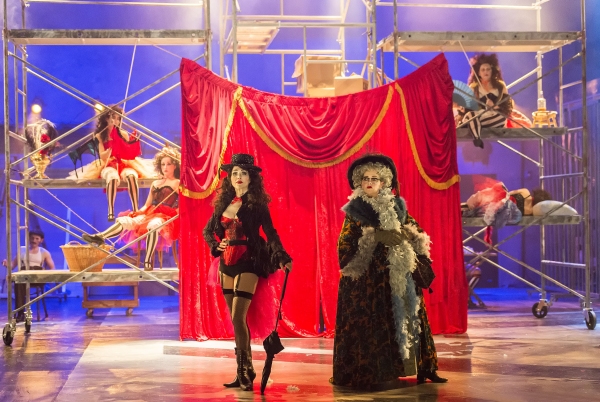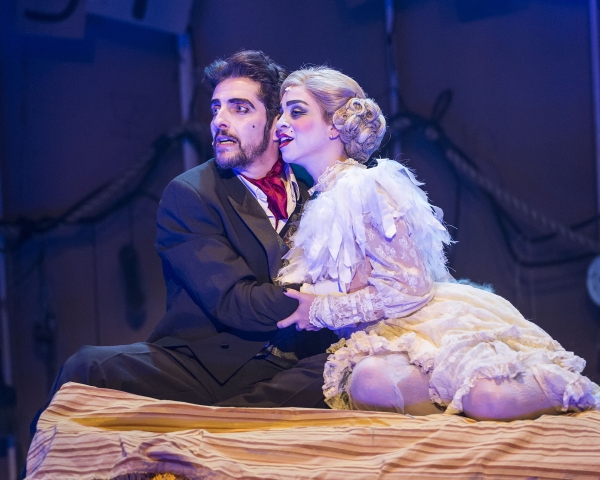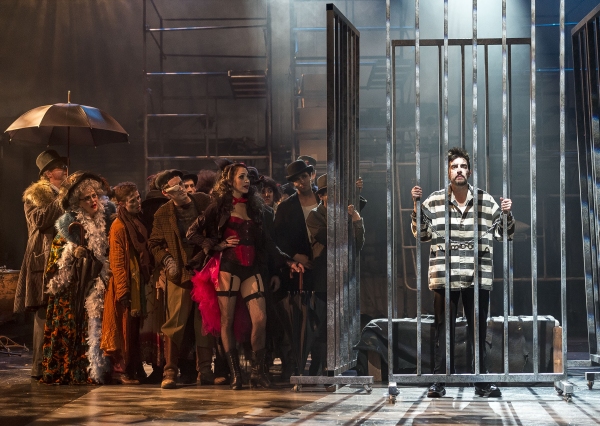Photo Flash: First Look at A Noise Within's THE THREEPENNY OPERA; JULIUS CAESAR Up Next!
A Noise Within (ANW), the acclaimed classical repertory theatre company, continues its 2014-2015 REVOLUTIONary season with two new productions: The Threepenny Opera, Bertolt Brecht and Kurt Weill's groundbreaking theatrical work in Michael Feingold's translation, now through May 9 (press opening February 21) and William Shakespeare's Julius Caesar, March 22 to May 8 (press opening March 28). While both plays spoke to the times in which they were first produced - Weimar Germany and Elizabethan England, respectively-they also speak to this season's theme of REVOLUTION, most especially from a socio-political point of view. Scroll down for a first look at THE THREEPENNY OPERA cast in action!
Both Threepenny and Caesar were created by a single design team, and are headed by Rodriguez-Elliott and Elliott as directors. While the plays can be enjoyed singly, both can also be seen on the same day as a matinee and evening performance as the foundation of REVOLUTIONRep on April 12, 25 and May 2. When seen back-to-back, the two plays become a still larger theatrical experience as their themes resonate and intertwine. On each of these three dates, 50 patrons will be able participate in immersive directing or acting workshops, have a chance to meet the cast and crew, and enjoy dinner and lively social interaction with other theatregoers between the two performances.
This is the first time in its history that A Noise Within has designed plays so that the scenic changeover can occur seamlessly between a matinee and an evening performance, thus providing for a panoramic view of the theatrical process. And while new in format, REVOLUTIONRep brings to high relief the repertory platform that has made A Noise Within one of the country's premier presenters of classical plays.
The Threepenny Opera debuted in Berlin in 1928. Threepenny is nothing short of a groundbreaking work of what is now termed Brechtian Theatre, in which the full use of theatricality is on display and the fourth wall is broken; the audience is aware they are watching a play, a reaction to a previous, more naturalistic approaches to stage works. When first produced, the musical challenged the audience's notions of how songs could be used to tell a story, and the characters' ostensible amorality was thought unworthy of expression in song. A Noise Within last produced The Threepenny Opera in 1997.
An adaptation of The Beggar's Opera by John Gay, Threepenny is a forerunner of modern musical theatre that follows the exploits of Macheath, Victorian London's most notorious criminal, surrounded by a stage full of rogues, foisting a radical new brand of theatre with music (in America Show Boat would have just premiered, and Oklahoma! would still be 15 years away) on audiences. Threepenny was not just rebellious in form, but also in content highlighting the failure of capitalism and celebrating socialism.
The plot begins as Macheath (Mack), the nastiest criminal in London, marries Polly Peachum, the daughter of Peachum, the boss of London's beggars, who gets a cut of their take for training them. Mack for his part has eluded jail due to his longtime friendship with "Tiger" Brown, the chief of police, whose daughter also has designs on Mack. A visit to a brothel, Peachum unleashing his beggars to ruin Queen Victoria's coronation, Mack arrested, put in jail and up for execution, and a surprise ending all figure into the story.
The cast of The Threepenny Opera features Andrew Abelson* as Macheath, Geoff Elliott* as Jonathan Jeremiah Peachum, Deborah Strang* as Mrs. Peachum, Marisa Duchowny* as Polly Peachum, Jeremy Rabb* as Jackie "Tiger" Brown, Abhimanyu Katyal as Reverend Kimball/Constable Smith, Stasha Surdyke* as Jenny, Maegan McConnell* as Lucy, E.K. Dagenfield as Filch, along with ensemble members. *Denotes member of Actors' Equity
Julius Caesar, a tragedy by William Shakespeare, is believed to have been written in 1599 and is one of several plays by Shakespeare including Coriolanus and Antony and Cleopatra that are based on true events from Roman history. The central psychological drama of the work is Brutus' struggle between the conflicting demands of his honor, patriotism and friendship. The main source of the play is Thomas North's translation of Plutarch's Lives. It is thought that the play reflects the general anxiety of Elizabethan England over the succession of leadership, anticipating the death of Elizabeth I.
A play of shifting civic tides, paranoia, and betrayal, Julius Caesar (last produced by the company in 2005) is a tense thriller steeped in civil war and the unending quest for power. Brutus, in concert with a cabal of senators fearing for the future of the Republic, slays its one true threat, Julius Caesar, but underestimates his power as emperor. The assassination throws the Republic into chaos and leads to the first Triumvirate. This play demands that its viewers consider just how far revolution can be taken. Though in Julius Caesar it is taken to the ultimate degree-assassination.
Julius Caesar's close friend Brutus is cajoled into joining a group of conspiring senators because of a rumor started by Caius Cassius that Caesar intends to turn republican Rome into a monarchy. Brutus argues with Cassius and struggles with his own conscience. The growing tide of public support soon turns Brutus against Caesar. A soothsayer warns Caesar to "beware the Ides of March"; ignoring the soothsayer as well as his wife's own premonitions, Caesar goes to the Senate.
Caesar, predictably, rejects a superficial petition, and Casca first stabs Caesar in the neck, and others follow in stabbing him; Brutus is the last. At this point, Caesar utters the famous line "You too, Brutus?" Mark Antony's speech over Caesar's corpse deftly turns public opinion against the assassins and rouses the mob to drive them from Rome. Next Brutus attacks Cassius for accepting bribes; the two are reconciled, especially after Brutus reveals that his beloved wife Portia has committed suicide; and they prepare for war with Mark Antony and Caesar's son, Octavius. That night, Caesar's ghost appears to Brutus with a warning. At the battle, Cassius and Brutus knowing they might die, smile a last smile to each other. However, Brutus wins that battle but Cassius dies -and with a heavy heart, Brutus battles again the next day. He loses, committing suicide by falling on his own sword.
The cast of Julius Caesar includes Robertson Dean* as Brutus, Rafael Goldstein* as Marc Antony, Freddy Douglas* as Cassius, with June Carryl*, Deborah Strang*, Apollo Dukakis*, Jill Hill* and Alison Elliott in various roles. *Denotes member of Actors' Equity
Single ticket prices for The Threepenny Opera and Julius Caesar start at $40. Contact the A Noise Within box office in person, via phone at 626-356-3100, or online at www.ANoiseWithin.org for updated pricing and seat availability. A Noise Within is located on the corner of Foothill Boulevard and Sierra Madre Villa Avenue at 3352 East Foothill Blvd., Pasadena, CA 91107.
Photo Credit: Craig Schwartz

Stasha Surdyke (Jenny Diver) and Deborah Strang (Mrs. Peachum)

Andrew Ableson (Macheath) and Marisa Duchowny (Polly Peachum)

Ensemble and Andrew Ableson (Macheath)
Videos
